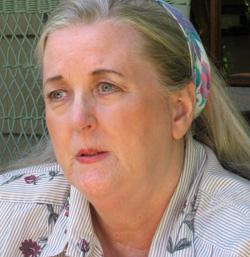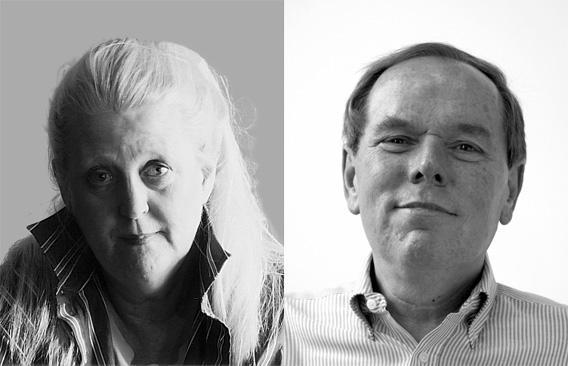Thomas Dunne, the publisher of Thomas Dunne Books at St. Martin’s Press, has published Jincy Willett’s writing since 1987. Amy Falls Down, Willett’s fourth book with Dunne, features novelist Amy Gallup as she navigates the new world of publishing—one in which tweets, platforms, and author branding seem as important as the book itself. In this conversation, Willett and Dunne discuss the evolution of the publishing business, how writers promote their books, and why Willett isn’t writing a best-seller every year.
Jincy Willett: It seems to me that what has changed about publishing is that now writers who are just getting started have to have agents. I find it hard to view this as anything but bad. Before, the new writer had to rise from the slush pile—to catch and hold the attention of readers—underpaid, educated people whose job it was to sift through a mountain of mostly unpublishable manuscripts. You had to write something good enough to keep that person reading. Now you have to write something good enough to keep an agent reading. The path to publication, which was always fraught and rocky (and rightly so), is much steeper now, and it’s all mixed up with marketing. Like Amy, I’ve not had to grapple with all of this, because I rose from the slush in the olden days. But I’ve witnessed the struggles of younger writers, and I feel bad for them. They’re actually expected to think like marketers—to answer questions like, “Who’s your book in the tradition of?” For God’s sake, it’s in the tradition of me.
Thomas Dunne: Agents are unavoidable.
Willett: But I didn’t need an agent in 1987. What has changed? Is it one more sign of the looming apocalypse, or are there just too many people submitting manuscripts now?
Dunne: Bingo. In the early days, we managed to read all the slush, at least the first few pages of slush. Now we can’t keep up with what the agents send us. Of course, there’s always self-publishing, which takes out both filters—the filter of the agent and the filter of the publisher/editor. I have encountered people, literate people, who had as many as 80 manuscripts in their closet, all terrible, but that was before the Internet. In the past 20 years or so, half the country thinks they have a book in them. Mass education, writing groups, creative writing programs, egad, so many people think they can write. Most cannot, and then there are a surprising number of people who are pretty darn good at stringing words together but have nothing to say, no story to tell. As Amy herself says, “There may still be more readers than writers, but surely we’re approaching some kind of catastrophic tipping point.”
Willett: Enter the agent.
Dunne: Precisely.
Willett: And hundreds of thousands of books are published every year, most of them unread by anybody outside the writer’s immediate family.
Dunne: You worry too much. The marketplace will sort out the stuff that won’t sell.
Willett: Sounds like an article of faith to me.
Dunne: Amy’s right about platforms. I hate that word as much as she does. As much as you do. But they’re a fact of life. If the would-be writer is a big-shot business consultant or professional lecturer—
Willett: —or has walked on the moon—
Dunne: —or let’s say you’re a TV celebrity and you want to write a novel. Any good agent will jump right on it. If you’re an embryonic Kardashian, you’ll get a book done.
Willett: A novel written by some slave in a basement. Yay. OK, what do you think of Amy’s point—which is obviously my point, since, let’s face it, Amy is basically me—that authors shouldn’t have to worry about marketing? I don’t, but I’m friends with other writers, and I teach, and it seems as though in order to even get an agent they’re expected to figure out what their book is in the tradition of and how to market it and what their stupid platform is, and that’s just ludicrous. If I knew how to sell shit, I’d be selling shit. I wouldn’t be writing.
Dunne: (Sardonic laugh.)
Willett: OK, so I spend most of my time not writing, which you’ve never understood is an important part of the writing process.
Dunne: (Snort.)
Willett: But honestly, my sales pitch when I was a kid was, “You don’t want these Girl Scout cookies, do you?” If I had to push my own books, I’d stop writing. I hate the conflation of marketing and writing.
Dunne: I wish you’d go back to writing stories.
Willett: What?!
Dunne: True, short-story collections don’t sell, and if I hadn’t been so new to the business in 1987, I probably wouldn’t have published Jenny and the Jaws of Life, but the stories are brilliant. And then David Sedaris dropped from the heavens and kicked your career back to life by citing Jenny as one of the great books of our time. It was like that deux ex scene in The Magic Flute. So we brought it back into print, and then it turned out you had an almost-completed novel in a drawer, which I got you to finish and to call Winner of the National Book Award, Rhode Island’s very own Gone With the Wind, and it got fantastic reviews everywhere. Stories are good luck for you. You need to write more stories.
Willett: So … you’re saying that the Internet age has not ruined everything for writers?
Dunne: You’re changing the subject.
Willett: Yes!
Dunne: No, I didn’t say that. There’s one profound problem, and it’s the death of the book review. It’s even worse than Borders going under. The loss of all but a couple of local reviews—look, when Jenny came out, there were all these newspapers with book review sections. The Detroit News, the Washington Post, the Atlanta Journal-Constitution, the Sacramento Bee—what a terrible loss, all of them. Jenny may not have sold like hotcakes, but you got at least 10 great reviews, which is probably why libraries bought the book, which made it possible for Sedaris to find it on a local shelf. Newspaper reviews are supposed to have been replaced by Internet stuff, but they really haven’t. People are supposed to flock to certain websites to find out what book to buy next, but so far, no flocking. And then there’s social media, which, so far, doesn’t seem to be making much of a dent. Maybe you really have to promote yourself. I didn’t used to push writers to do readings—
Willett: No. N-O. My readings, except for a great one in 2008 in a wonderful local independent, have been disastrous. You show up in Pasadena to a room full of people all excited because somebody screwed up and they think they’re going to meet Steve Martin. You come to B&N for a signing and find that somebody dropped the ball and nobody’s there. The ball always drops, and not in a good way.
Dunne: The saddest spectacle in the world! A distraught writer sitting at a table full of unsigned books.
Willett: Yes, but look: If you’re lucky enough to be able to write down what’s really in your head—not what you think should be there but what’s actually there, the essence of your own experience, and if you actually get it published, so that someone, somewhere, at some time can read you, you’re very, very lucky. It would be nice to be able support yourself that way, but it’s not necessary.
Dunne: Have you ever considered motivational speaking?
Willett: I could hire myself out as a professional counterexample.
Dunne: And if your husband hadn’t died, and if you had not buried yourself in a San Diego suburb for 30 years, and if you did not refuse to fly and therefore promote your books … and if you were not so glacially slow a writer, you would be recognized by even the pettifogging blowhards in the academy as a national treasure. Maybe someday that will still come to pass. I sure hope so.
Willett: I’m not exactly the zeitgeist queen. We’re not talking about publishing any more, are we?
Dunne: Let’s end with Amy Falls Down. We are trying to, you should excuse the expression, sell it. One memorable line—out of many—is when she says, “Feelings are not news, but they are the rightful province of art … Fiction, when it’s done right, does in the daylight what dreams do at night: we leave the confines of our own experiences and go to common ground, where for a time we are not alone. Where we don’t have to ask how it feels, because we feel it for ourselves.” Is this what you mean by “writing what’s really in your head”?

Courtesy of Jincy Willett.
Willett: Yes, it means sifting through all the chatter and the rubble, seeing past the beckoning, seductive clichés, grasping the slippery truth, probably only for a moment, but for that moment, you’ve got it, and you can get it down. With this book I hope what I always hope—that readers will nod their heads (not constantly, you know, but at the odd juncture) and think, “Yes, that’s exactly right.” This is why we write, and this is why we read. It’s an act of communication, and if what you’re communicating is true—if you haven’t screwed it up (and there are so many ways to do that)—the response of your ideal reader isn’t “Wow! What a fabulous sentence!” or “Wow! I did not know that!” It’s “Yes. Exactly. I felt that too once, and I forgot it until now, and I thought I was the only one.”
—
Amy Falls Down by Jincy Willett. Thomas Dunne Books/St. Martin’s Press.
See all the pieces in this month’s Slate Book Review.
Sign up for the Slate Book Review monthly newsletter.
